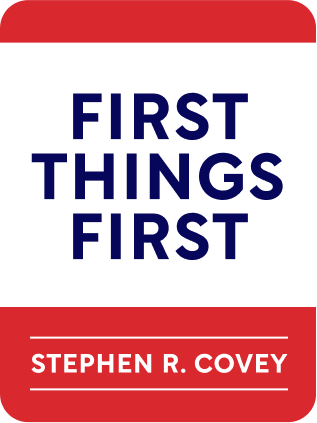

This article is an excerpt from the Shortform book guide to "First Things First" by Stephen R. Covey. Shortform has the world's best summaries and analyses of books you should be reading.
Like this article? Sign up for a free trial here .
Do you want to learn how to set effective goals? How can the Stephen Covey goal setting process help you maximize your chances of achieving your goals?
According to Stephen Covey, goal setting is a key part of self-improvement and time management methods. However, goals can be counterproductive if you don’t set or execute them carefully and conscientiously.
Keep reading to learn about the Stephen Covey goal setting method.
Stephen Covey: Goal Setting & Four Human Endowments
In order to set and pursue goals that create positive results in your life, you must base them on the four unique human endowments:
- Conscience ensures your goal grows out of your mission, passion of vision, and principles.
- Self-awareness helps you set goals that are realistic and acknowledge the possibility of change.
- Creative imagination allows you to envision a new possibility and think of ways to achieve it.
- Independent will gives you the strength to set a goal and carry it out.
Traditionally, goals tend to lean heavily on just two of the four endowments: creative imagination and independent will.
You use creative imagination to imagine an alternative possibility and think of a goal that could make that possibility a reality. Your independent will comes into play when you’re working to achieve that goal, making deliberate efforts and choices that may be contrary to your habits and conditioning.
But without conscience and self-awareness, you’re more likely to set and achieve goals that lead to the painful outcomes described previously.
Use Conscience to Create Principle- and Mission-Based Goals
According to Stephen Covey, goal setting is as important as your success in executing them. When you set a goal, you’re choosing a result you want to create in your life—but what’s dictating that choice?
If your goal is influenced by the social mirror, by others’ values and expectations, then you’re setting yourself up to possibly pursue an unrealistic goal or work hard to reach a goal that ultimately won’t bring you happiness and quality of life because it doesn’t align with your principles and mission.
On the other hand, if you use your conscience to create a goal that’s inspired by your mission and based on true north principles, it’ll always be a worthwhile effort because pursuing it will bring you closer to your mission. In addition, the passion of your vision will energize you as you work to accomplish your goal.
Make sure your conscience is leading your goal-setting by asking three simple but critical questions:
1. What? Ask yourself what you want to accomplish, what you want to contribute, and what result you want to create.
2. Why? Ask yourself why you want to accomplish this goal. Is it an outgrowth of your mission, principles, and basic needs? Does it help you achieve self-transcendence and contribute to a higher purpose?
According to Stephen Covey, goal setting should be underpinned by the “why”, not the “what”. Identifying your “why” is often more challenging than the “what,” but it’s critically important because it keeps you from setting goals out of a sense of duty or misguided intentions. Without understanding your “why,” you’re more likely to set goals that are based on the social mirror and have no connection with your own personal mission and vision. Additionally, when your “why” is aligned with your personal mission, your passion and deep conviction for that vision will help motivate and push you during the most difficult moments of pursuing that goal.
3. How? Once the “what” and the “why” have justified the goal you’re setting, ask yourself how you’re going to carry it out, from physical strategies to mental motivation.
Use Your Self-Awareness to Build Your Personal Integrity Account
As mentioned earlier, making and keeping commitments to yourself and others add to your Personal Integrity Account—which contributes to your confidence and courage—while breaking those commitments withdraws from that account.
The key to making commitments that you can keep is to use your self-awareness to evaluate whether the goals and commitments you’re making are appropriate: If your goals are too high and you fail to reach them, you end up making a major withdrawal. But if you set your goals too low, you may be making small deposits when you could be making much more significant deposits to your Personal Integrity Account.
When you do fail to reach a goal, self-awareness also helps you recognize why. If you blame other people or circumstances for a failure—when in fact you set an unrealistic goal or failed to carry it out—then you may pass up other opportunities to set or achieve goals that would make deposits to your account.
Self-awareness helps you recognize when changing circumstances make a goal impossible or unwise. Rather than allowing that change—which is out of your control—to make a withdrawal from your Personal Integrity Account, acknowledge the possibility for change when you set and pursue each goal. Your personal integrity, in turn, keeps you connected to your mission so that you can adapt and stay on course in the midst of moment-to-moment changes.
Self-awareness requires being deeply honest with yourself, although it can be difficult. You need to honestly ask yourself if you have what it takes and whether you’re willing to do what it takes to achieve a goal. Ask yourself whether you’re willing to take full responsibility for your personal growth, including for failures you make along the way.
Through this process, you can set goals that are realistic. This kind of honesty also acknowledges that you’ll need to push and stretch yourself in order to grow and accomplish your goals. Setting goals that are not only realistic but also challenging is an empowering process that fosters inner peace and personal growth.
Stephen Covey: Goal Setting Strategies
In addition to using all four human endowments, there are three strategies that can help you set effective, principle-based goals.
- Setting “context” goals
- Making a “perhaps” list
- Setting weekly goals
Set “Context” Goals
According to Stephen Covey, goal setting is most effective when it is contextual, that is, when your goals feed into the bigger picture of your life. For example, if your goal is to maintain good physical health, you may make a long-term goal of becoming vegetarian and running five hours a week within five years, which you narrow into a weekly goal of eating four meatless meals and exercising for three hours.
However, these long- and mid-term goals fall into the trap of putting goals in a chronos, clock-oriented framework. Context isn’t just about looking at the long term, but at the broader view of why you do things; instead of using the clock for context, create context by identifying your “what,” “why,” and “how” for your goal.
For example, for the same goal of maintaining a healthy body (that’s the “what”), your “why” might include that you want to have the physical strength and endurance to pursue your mission, you want to be a positive example of self-care and good health to your children, and you want to strengthen your personal character by sticking to a healthy eating and exercising regiment. Your “how” can include making nutritious meal choices, maintaining a daily exercise routine, committing to positive thinking, and continually learning about good health and nutrition.
The “what/why/how” approach maintains a strong connection between your mission, principles, and goals. It also helps you see how your various roles and human needs are interconnected, so that you can make goals that are synergistic and address multiple needs or roles at once.
For instance, when you have the “what/why/how” context for your goal of good health—which is in the physical dimension of your “sharpen the saw” role—you’re reminded that one “why” is your desire to set a good example for your children. With that in mind, you can set a weekly goal of taking a hike with your children, which also incorporates your social dimension as well as your role as a parent. By contrast, if you’d created context by simply having a long-term goal of exercising more hours per week, you’d be less likely to recognize the opportunity for such a synergistic weekly goal.
Make a “Perhaps” List
Sometimes you may be struck with inspiration that could be a goal, but you aren’t ready to commit to it yet. You need time to evaluate whether it aligns with your mission, but don’t want to lose the idea. Put it on a “perhaps” list.
A “perhaps” list gives you a place to write down possible goals before prematurely committing to them and risking a withdrawal from your Personal Integrity Account. Without such a list, these kinds of ideas either bounce around your mind—cluttering your thoughts and giving you a sense that there’s something you should but haven’t accomplished—or land on a catch-all to-do list that grows faster than you can tackle it and mingles priority tasks with unimportant matters.
Set Weekly Goals
Setting weekly goals, as discussed as part of the Quadrant II organizing process, gives you an opportunity to think about your roles and your mission within each role. Using the “what/why/how” context helps you see what’s important for each role as you set your goals. This constant reminder of your underlying mission, vision, and principles also helps you recognize when opportunities arise that align with your mission.
As you set and achieve weekly goals, you’re also making constant progress toward your mission as well as regular deposits in your Personal Integrity Account. This increasingly builds your confidence and conviction to make further and more substantial progress moving forward.
Goal Setting Checklist
- Determine your “what,” “why,” and “how” to create context goals in each role. Consult these context goals as you set your weekly goals.
- Create a “perhaps” list for each role in your planner. Add ideas to this list as they come to you, and consider the items on this list as you set your weekly goals.
- When setting your weekly goals, be sure to use your conscience to ensure you’re doing what’s most important for each role.
- Be sure to use all of your four human endowments in setting and pursuing your goals.
- Classify each of your weekly goals as either a determination or a concentration. At the end of the week, reflect on how making that distinction influenced how you approached and executed the goal, and where your Personal Integrity Account is as a result.

———End of Preview———
Like what you just read? Read the rest of the world's best book summary and analysis of Stephen R. Covey's "First Things First" at Shortform .
Here's what you'll find in our full First Things First summary :
- How to work effectively, not just efficiently
- Why you need to think more about what you're spending time on than how much time you're spending
- The 6 steps to effectively schedule and prioritize important activities






